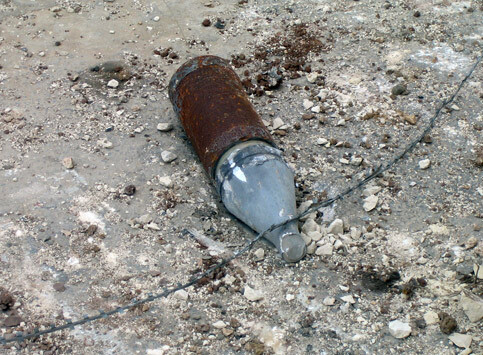United Nations News Service 31 August 2006

The presence of large numbers of unexploded bombs in south Lebanon is endangering civilians. (Serene Assir/IRIN)
Lebanese troops today moved into more areas of the south of the country after Israeli forces withdrew, the United Nations said, as it continued to coordinate the deployment and stepped up its work to clear the masses of deadly unexploded ordnance that litter the countryside.
“The Lebanese Army has started the deployment in the general area of Bastra and the area south of the Kafr Shuba and Shaba villages in the Eastern part of South Lebanon where the Israeli Defence Forces (IDF) withdrew on 30 August,” the UN Interim Force in Lebanon (UNIFIL) said in a press release.
Carrying on the Force’s humanitarian work, in the past 24 hours UNIFIL’s Chinese Battalion disposed of over 250 pieces of unexploded ordnance, while teams from the Mine Action Coordination Centre (UNMACC) carried out controlled demolition of over 300 pieces, it said.
The UN estimates that around 120,000 pieces of unexploded ordnance litter southern Lebanon, the vast majority cluster bomblets, and since the cessation of hostilities began on 14 August, this menace has already killed 13 people and wounded almost 50, the Office for the Coordination of Humanitarian Affairs (OCHA) has said.
This ordnance remains the biggest threat to civilian life in Lebanon because as well as killing people it affects livelihoods by killing and wounding animals and preventing farmers from working their fields. UNIFIL said today that its contingents provided medical care to 145 people and veterinary services to over a thousand animals.
“Cluster bombs are all over the place … All the places they have the bombs. [Animals] can’t graze. They can’t go,” said Major Bapu Parasanalli of the Indian Battalion of UNIFIL, a veterinarian who has been working with animals wounded by cluster bomb shrapnel.
“They may have some blasts and they may lose their goods. Already they have lost a lot of animals,” he added, referring to the goat and sheep herders who cannot use their fields. Hundreds of sheep have already been killed by the deadly ordnance as thousands have been forced away from their normal grazing, he added.
Teams from the UN High Commissioner for Refugees (UNHCR) are also working alongside the UNMACC to publicize the dangers of unexploded ordnance and have been in villages near the port city of Tyre spreading the message.
“This training is crucial, especially for children who are innocent, want to play and are totally unaware that small little items can be so harmful,” said Dalia Farran, UNMACC’s media and clearance officer at a playground just outside Tyre.
UNIFIL also continued its efforts today to help ease the chronic water shortage faced by many villagers in the south and supplied over 40,000 litres to those in need.
Related Links